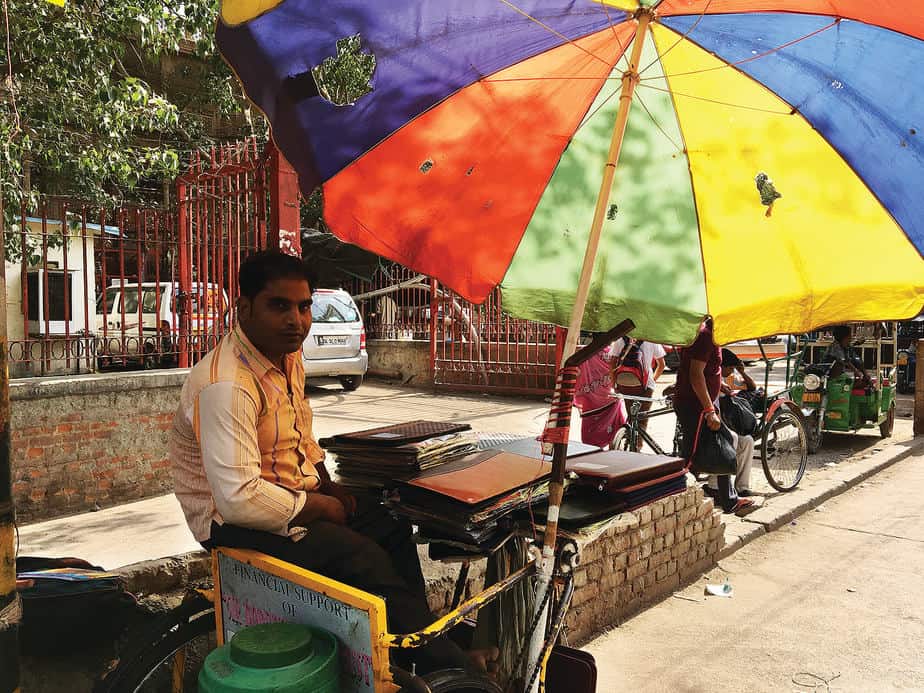This is the story of a differently abled young man who has to continually find new ways to earn a livelihood, with a little help from friends
Mohd Yusuf, 27, sells stationery items like folders and files at the Chandni Chowk metro station gate, in front of Shiv Shakti Mandir. His shop is his ‘handicapped rickshaw’, which was given to him by Delhi government as part of a welfare initiative. Yusuf belongs to Raas, a village in the district of Bareilly. He is affected by debilitating polio since he was three years old. He knew he wouldn’t be able to lead a normal life, but despite his disability he was determined to lead an independent one.
Yusuf belongs to a family of poor peasants. And while his circumstances were difficult, he pursued his studies and went on to graduate from Rajendra Prasad Degree College, Bareilly. He couldn’t go for higher education, although he would have
liked to.
All this while he was trying to get into a government job, appearing for various entrance examinations, but couldn’t succeed. He alleges that he could not get a government job because he couldn’t pay bribes to the authorities. It could be his way of coming to terms with these series of failures, but he was not bitter, and he never stopped trying. He would use internet to access reading material, read it on his mobile, as he couldn’t afford to buy books. He was happy with this arrangement as he’d get access to updated study material on the internet. “I try to give my best and leave the rest on the Almighty,” he says in Hindi.
Yusuf married Shaheen (name changed) from Rampur, an arranged marriage. When his father expired in 2015, Shaheen went to live with his mother in his home village. He can’t afford to keep his wife in the city. One of his brothers is working in Saudi Arabia, while the other two are petty contractors in Delhi. His brothers want to help stabilise his life, but Yusuf’s self-respect doesn’t allow him to take financial favours from his own brothers. He has a firm belief in his own abilities to provide a decent life for himself and his family.
A self-made man, even during college, Yusuf used to work with a local company to pay for his education . He learned, amongst many things, to repair touch screen mobiles after doing a course that costed him R10,000. He ran a mobile repair kiosk outside the electronic shop owned by his cousins. He would work hard for 12 hours a day and earn on an average a thousand bucks a day. But life had more challenges in store for him: within a few months the electronics shop closed down and with it his mobile repair business.
With no positive avenues available, he was forced to come to Delhi in 2016. Many of his friends who were living in Delhi, mostly unskilled labourer, hosted him in the city. And his new tryst began. One of his friends helped arrange an e-rickshaw for him on a daily rent of R250. He had to modify the rickshaw to his requirements: instead of pedal brake, he had a handle brake. In this way, he could sustain his stay in Delhi by making R400 after paying the rent. He was not only able to make a living, but also explored the city with commuters. Tourists would sometimes tip him handsomely, impressed by his resilience.
But then destiny again had new challenges to offer. E-rickshaws were banned in the fort. He was again out of business.
In desperation to find a job, he moved around in the city riding his modified rickshaw to find some work. Disability prevented him from getting a decent job. He wasn’t disheartened. There was no way he could live in Delhi without a job. He would go back to his rented room — for which he pays a monthly rent of R3,000, sharing with a friend — tired and depressed, but never allowed himself to lose hope. A new day brings new hope and energy. A friend of his, Mohan Lal, suggested, that since it’s next to impossible to find a job with this disability, it would be a better idea to do a small business using his rickshaw. Lal connected him to the wholesale dealers of stationery products. Every morning, he would collect supplies from the wholesale dealer and park his rickshaw at the exit gate of Chandni Chowk metro station, and that’s how he found yet another way to support himself.
In India around 2.21% of the total population suffers from one or other form of disability, as per the 2001 Census, which is more than the population of Australia. Therefore, Yusuf, who’s a good example of a conscientious and honest young man with disability trying to make a decent living, is not wrong when he says that people with various disabilities are clubbed together and stereotyped as unproductive people. “I feel that the government should take special steps to deal with the issue of differently-abled persons by providing them better employment opportunities,” explains Yusuf.
It has been around a year and a half, Yusuf leads a disciplined life. He wakes up early in the morning, rides his e-rickshaw to the wholesale market at Sadar Bazar, some 8 km from his room to buy his daily stock. He spends long days in this sizzling heat under the shade of a garden umbrella. But he hasn’t lost hope for getting into a decent government job, for he’s
motivated to serve the nation. He has also joined Divyang Sena — an organisation that fights for the rights of disabled people.
Yusuf’s struggle is far from over while Delhi — the mega-metropolis — continues to attract people like him from the hinterland looking for a livelihood.





